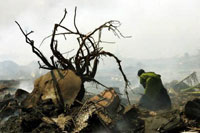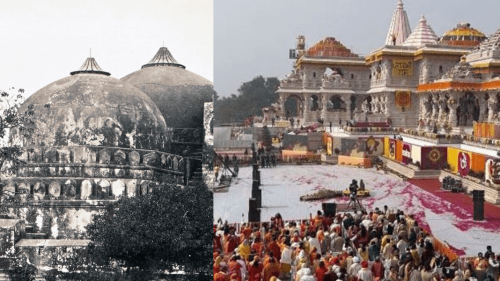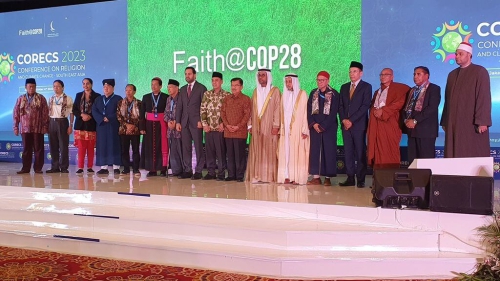Humanity Must Rise to the Rescue
Exactly one year after a quake in Bam Iran killed 31,000 (Dec 26 2003) the world is in much shock about the disastrous earthquake and tsunami in the Indian Ocean, much sadness too -- and a desire to do something, as reports just keep on pouring in about the aftermath of the devastation.
Largest Natural Tragedy
 |
This week (Sunday December 26, 2004) we witnessed the largest natural tragedy to strike the human race in modern times. A 9.0-magnitude quake struck 6 miles beneath the ocean and ruptured a 600-mile stretch of fault running north and south off the coast of Sumatra. The quake moved the entire island of Sumatra about 100 feet to the southwest. Such a large earthquake beneath the sea floor causes a large region of the seabed to drop which in turn results in the whole sea above -- perhaps over an area of hundreds of square miles -- to drop by the same amount, setting off a train of massive waves known as tsunamis which can accelerate to 600 mph and stretch up to 100 miles long. Such a Tsunami developed and the result ... within hours - over 150 000 dead, over 40 million displaced, over a million injured, thousands missing, leaving up to five million people across 12 countries without access to the basic requirements for life - water, food and sanitation. We are indeed witnessing devastation of biblical proportions, suffering unprecedented in contemporary times; death and destruction beyond belief, affecting the most heavily populated areas of the world. The images of the aftermath of the Tsunami and earthquake are shocking and by comparison with past disasters, this one has not been confined to just one country or region, neither in terms of impact nor in news worthiness. This is the first cataclysmic tragedy in which the entire Indian Ocean region is both shocked spectator and direct victim.
Disturbing Images
The epicenter of the quake was in Indonesia; its shockwaves and the subsequent tsunami spread to Sri Lanka and as far as the eastern seaboard of Africa. The countries most devastated are Indonesia, Sri Lanka, India, Thailand, Somalia, Burma, Maldives, Malaysia, Tanzania, Seychelles, Bangladesh, and Kenya. Amateur videotape played on television showed terrifying scenes from several countries of huge walls of water crashing through palm trees and over the tops of buildings and roaring up coastal streets with cars and debris bobbing on the surface. The wave arrives like a great, big, huge tide coming in quickly, with the tall wave washing everything away before it for hundreds of yards inland, then the wave washes out, ripping down buildings and dragging debris and people out to sea with an inescapable pull. The receding wave is often the deadliest part of the tsunami, particularly hard on the elderly and infants too weak to hold onto anything. To backdrops of screams and shouts, people were shown clinging to buildings, being swept away by the current, running for their lives, weeping, carrying the injured and cradling dead children. The images we see are moving;
10,000 people had been killed in a single town, Meulaboh, in Aceh province at the northern tip of Sumatra island, the hardest hit region in Indonesia.
In Sri Lanka, around 1,000 people were dead or missing from a train that was flung off its tracks when the gigantic waves hit
A bulldozer dug a mass grave in Tamil Nadu, southern India for 150 young boys and girls, as their weeping parents looked on.
In the aftermath, hundreds were buried in mass graves, millions were displaced from their destroyed homes, hospitals ran out of medicine, and food and water are scarce.
Lessons we Learn
We live in a universe of cause and effect and the consequences of certain causes are inescapable. Fire burns, water drowns, disease germs destroy. These facts have moral and social implications. Certainly the giant waves generated by the quake made no attempt to differentiate between the religions of those whom it made its victims. Hindus were swept away in India, Muslims were carried off in Indonesia, Buddhists in Thailand. Visiting Christians and Jews received no special treatment either. The world is anything but serene and still. We are all vulnerable to natural threats, both internal and external. Meteor showers, asteroids are only a few of the factors likely to pose threats to the world from space. As for the seemingly solid earth, the planet's interior has an inner core of molten elements. It surely would not be an exaggeration to call this part of the earth, which remains invisible to our eyes, "a flaming core". There also exists an atmosphere surrounding the earth, which is a "shield" against external threats. Yet, no part of the earth is immune against the effects of atmospheric forces like thunderstorms, storms, or hurricanes or celestial dangers like meteors. Any of these hazards may strike at any time. They can cause considerable loss of life and property. What is common to all these disasters is that in just moments they can reduce a city, with all its inhabitants, to ruin.
We should reflect on the fact that ...
- These outbursts of nature are reminders to all mankind that we have no control whatsoever over the planet. Likewise, each disaster serves the purpose of reminding us of our inherent weakness. These are surely warnings to those that can contemplate the significance of such events and draw lessons from the experience of others.
- The terrible effects spreading all around the Indian Ocean and reaching as far as the Horn of Africa are a further reminder of the global threat from natural catastrophes.
- The modern era flatters itself that human beings can now know and shape almost everything about the world. But an event like the Indonesian earthquake exposes much of this for the hubris that it is. Whatever else it has achieved, the Indian Ocean tsunami has at least reminded mankind of its enduring vulnerability in the face of nature.
- Each one of these events is important in the sense that it reminds man that neither wealth nor power, science nor technology has any power to resist the forces greater than ourselves.
- Suddenly we know the frailty of our place in the world just like those billions of people for whom frailty is all-too-familiar. The hope is that our newfound sense of vulnerability will lead to a kind of international empathy and solidarity. Such empathy could be the cornerstone of a new spirit of international cooperation -- a cooperation that provides the only way to ensure a better world.
 |
| Indonesian survivors walk through debris surrounding the biggest mosque in Banda Aceh |
Allah did not make this world a permanent world. This is a temporary world and everything here is finite and has a time limit. When its time comes it will die. Neither the good things of this world are forever, nor the bad things eternal.
One has the challenge to frame the terrible traumatic events into a new crucible of meaning. Having been helpless does not mean that one is a helpless person; having witnessed or experienced evil does not that the world as a whole is evil; witnessing the devastation caused by earthquakes and tsunami does not imply that nature is destructive; the fact that God allows nature to take its course does not imply a lack of compassion. Rather, all this is a challenge to us as to what we do in the face of such challenges.
We have to respond to Allah's call for helping the distressed than debate about Allah's judgment as to why these disasters are allowed to happen.
Let's Help Alleviate the Suffering
Southern Asia's earthshaking event has brought all the Earth's people closer. Few tragedies in history have opened so many hearts to so many victims. Such moments of shared mercy need to be more than remembered. This unusual drawing-together of millions and millions of people must be sustained in many ways, long after the images of a tsunami's horrific images leave the TV news. The millions of people who have lost loved ones, their homes, businesses, and entire villages need help for months to come, through each after-stage of this calamity. The scale of the tragedy demands a continued global response. According to the World Health Organization, Disease could double the death toll from the tsunami; "The immediate terror of the tsunami may be dwarfed by long-term suffering in the affected countries where the risk of widespread disease is very high"
Experts said the top five areas to be addressed were water, sanitation, food, shelter and health. Humanitarian agencies began what the United Nations said would become the biggest relief effort the world has ever seen, and the costliest ever. As we commit ourselves to assist, remember, many of the victims are children and most of the affected are among the world's poorest people in among the most densely populated parts of the world. The Prophet Muhammad constantly exhorted helping the poor, alleviating the suffering of the distressed and mercy for the young.
People have suffered an unprecedented calamity due to natural causes; it is our turn to respond to their needs with equal generosity and speed, rather than merely watch the process on television as detached spectators. The Prophet (peace and blessings of Allah be upon him) said: "Whoever meets the needs of his fellow human beings, Allah will meet his needs."
To help the victims of this tragedy you can Donate Here
Sadullah Khan is the Director of Islamic Center of Irvine. He has presented lectures on Islamic Civilization at California State University at Dominguez Hills. He is a frequent lecturer for the Academy of Judaic, Christian and Islamic Studies at UCLA (University of California, Los Angeles). He is also an advisor to the Chancellor's Committee on Religion Ethics and Values at UCLA and serves as Director of Muslim Affairs at USC (University of Southern California).
You can watch his lectures on Empowerment at IslamiTV
Topics: India, Indonesia, Nature And Environment
Views: 4648
Related Suggestions
Algeria 2
Kuwait 10
Libya 2
Qatar 25
Saudi Arabia 30
UAE 20
While the US gave $350 million. No matter what the USA does, they will be critisized. Can someone tell me how much money the wealthiest princes in Saudi have? The USA is giving much of its money to Indonesia - a muslim country. Please get your people to step up and donate. US corporations are donating 10s of millions privately. My company Pfizer themselves are giving $10 million in cash plus supplies - more than most islamic nations combined.
In the words of Jan Egeland, "I'd rather see competitive compassion than no compassion." Perhaps consider comparing that sentiment with "...strive together (as in a race) towards all that is good..." [Quran 2:148].
The journey is to Allah. Let Allah be the goal. Inna lillahi wa inna ilaihi raji'un.
you might said that perhaps masjid baiturahman (banda aceh city) is made from solid cement, but mosque in Meulaboh, sigli and many aceh suburban areas is stil standing tall, even made only from woods and roots!! while other solid biuldings are flat to the ground..
Allahu Akbar.
Even in modern times such horrific disasters are hardly unknown and seemingly not all that far distant from Bam or Sumatra either. With respect to those who might be contemplating the part played by divine judgement in these tragedies, for at least several thousand years mankind has been the dominant species of this world - and perhaps that might somehow be relevant.
Granted, whenever man has "defeated nature" perhaps "nature" has not really been trying especially hard (to defeat man). All the same, perhaps consider telling your children to tell their children to tell their children what it means when the sea recedes unexpectedly. And may peace be upon your descendents - as well as upon their ancestors.

















